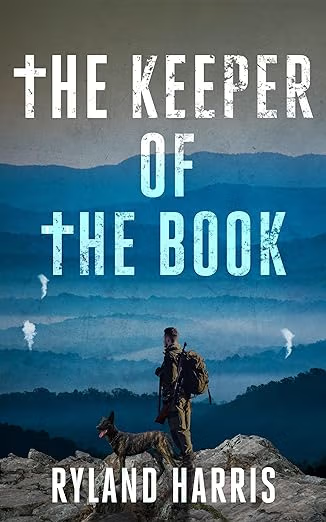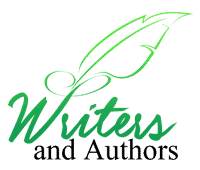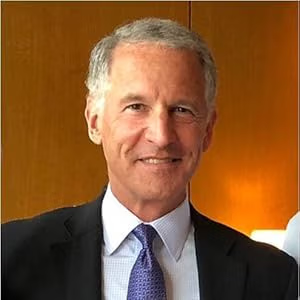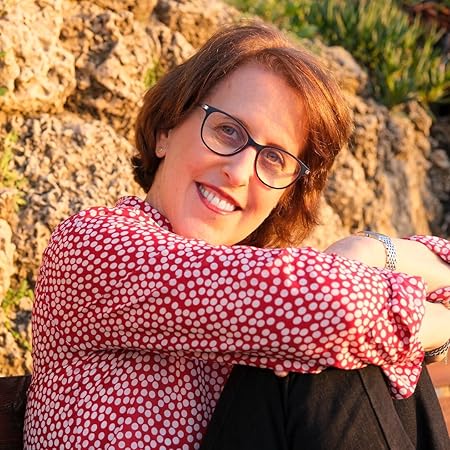It is the year 2043, where World Council Edict 1735B has extinguished the flames of religious freedom across the globe. In this chilling dystopian reality, author Ryland Harris introduces us to The Keeper of the Book, a tale of a world torn by authoritarian rule. In this interview, Harris shares with us the inspirations and challenges behind crafting this cautionary narrative. We’ll talk about the themes of prophecy, courage, and relentless determination that you’ll find throughout the pages of this thought-provoking novel.
What inspired you to write The Keeper of the Book and how did you approach the writing process?
The Keeper of the Book is a cautionary tale. I tracked current events and projected them twenty years into the future. I was inspired to write it as warning if we continue on our present path. At present our societies all over the world are being torn apart by divisiveness which if allowed to continue evolves into tribalism, violence and chaos. If we continue down this road of chaos it will result in a frightened world looking for a savior. The end result being the installation of a global fascist government which the people will embrace at first then revolt against causing more chaos and death. Perhaps if the readers experience the world of 2043 they will see the forewarning in The Keeper of the Book.
Can you share any personal experiences or influences that shaped the storyline or characters in the book?
One of the main personal experiences for me in developing my protagonist Michael Keane was time spent in the United States Marine Corps. Michael brings extensive Special Forces training to the story. Another influence was my mother who was an avid Christian. She prayed constantly for me when I was in the military and swore that her prayers were what brought me home alive each time. The antagonists in the book are based on a compilation of real people I have met in Hollywood, studio executives, agents, and public officials whose behavior is revealed to be abominable.
The concept of The Keeper of the Book is central to the plot. What inspired this unique role, and what significance does it hold within the story?
In the year 2043 all churches, temples and mosques had been shut down for “public safety” concerns. They were labeled places of dissension. The possession of any religious artifact or book is punishable by death. Jenny Keane is a Christian and her favorite possession is a Bible given to her by her great, great grandmother O’Keefe. She is captured by soldiers at an illegal church meeting and taken to a reeducation camp. Michael is not a believer in any religion. He believes in tactics, strategy, fire power and robust execution. Michael gathers the Book minutes before the house is raided by soldiers and heads out on his rescue mission. The Book is all he has left of Jenny so he keeps it with loving care.
How did you balance the elements of adventure and science fiction in the novel? Were there any challenges in maintaining this balance?
I balanced those elements by having Michael avoid the futuristic tracking technologies by taking to the forest. He avoids the highways and systems under surveillance by satellites and drones by entering the vast National Forests in the story.
What do you hope readers will take away from The Keeper of the Book after reading it?
I hope they will take away that no matter how severe the plight you face, begin. Take one step, then another, then another. If you do this and move forward the universe will come to assist you. In the end you will see the triumph of the human spirit.
Can you discuss any research or world-building techniques you used to create the universe in which the story takes place?
The world building in the book focuses mainly on the ridiculous dictums and laws set forth by a global government sitting atop a bloated world bureaucracy. The world is no longer comprised of nations but rather of regions according to their economic strengths. For instance Quadrant Four in the old Russian sector is divided into new lines strictly for the purpose of providing timber to the rest of the world. Quadrant Two, the old Canadian provinces for instance are responsible for supplying water from their lakes worldwide.
Were there any specific scenes or moments in the book that were particularly challenging or rewarding to write?
Yes the action scenes are especially tedious for me. Action scenes are essential and usual contain some form of fighting or violence. I have to choreograph a fight scene that may last only seconds but I have show punch by punch, move by move to support the movie playing in the mind of the reader. At the same time I am trying to make the violence elegant and horrifically beautiful.
The characters in The Keeper of the Book undergo significant development. How did you approach character growth and evolution in your writing?
I approach character growth organically. It is not predetermined. I bring the characters into their experiences and let them evolve as they will. The characters tell me how they will evolve. I believe you must do that or the book becomes no more than a blue print. The characters have to be given their own space to manifest themselves if you allow them they will elevate the story most times beyond the author’s imagination.
Do you have any favorite scenes or characters from the book? If so, what makes them stand out to you?
One of my favorite scenes is when Michael and Ury meet up with Hank Bailey. He offers them transportation but it has to be in the back of his rigs with some thirty hogs he is taking to market. He ignores the reward money for Michael’s capture and in spite of the danger helps him on his way to the Ohio River.
Are there any themes or messages in the novel that you hope will spark discussion or reflection among readers?
Yes I would like for them to discuss and take a moment to experience the divine power that exists in the human spirit.
Find the Author
Twitter: @RHarrisbooks
Instagram: @rylandharrisbooks
TikTok: @rylandharrisbooks
The Keeper of the Book
In the year 2043, World Council Edict 1735B proclaimed that all of the world religions were to be outlawed in the interest of public safety. Houses of Worship were labeled centers of dissension and  attending any underground religious service was punishable by imprisonment and relocation. To possess any religious artifact or Holy Book was a mandatory death sentence. Jenny Keane is a Believer, a Christian and the proud owner of a Holy Bible given to her by her Grandmother. Michael Keane, her husband, is a former Special Forces Operative. He is not a believer in the holy teachings of any religion. Michael gave up the warrior path to live a cherished, peaceful life with his family. Jenny and the children, while attending an illegal religious service are captured by sadistic One World troops and taken to a reeducation camp. This sets Michael out on a one man rescue mission to bring his family home and nothing short of death will stop him. Against impossible odds he walks a path of revenge and destruction with no negotiation, no rules of engagement and no mercy for his foes. He is aided by the unseen prayers of the faithful and years of experience in killing his enemies.
attending any underground religious service was punishable by imprisonment and relocation. To possess any religious artifact or Holy Book was a mandatory death sentence. Jenny Keane is a Believer, a Christian and the proud owner of a Holy Bible given to her by her Grandmother. Michael Keane, her husband, is a former Special Forces Operative. He is not a believer in the holy teachings of any religion. Michael gave up the warrior path to live a cherished, peaceful life with his family. Jenny and the children, while attending an illegal religious service are captured by sadistic One World troops and taken to a reeducation camp. This sets Michael out on a one man rescue mission to bring his family home and nothing short of death will stop him. Against impossible odds he walks a path of revenge and destruction with no negotiation, no rules of engagement and no mercy for his foes. He is aided by the unseen prayers of the faithful and years of experience in killing his enemies.





















